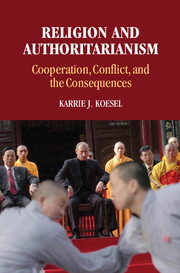Book contents
- Frontmatter
- Dedication
- Contents
- List of Figure, Table, and Illustrations
- Acknowledgments
- 1 Introduction: The Politics of Religion
- 2 Religion and State Games
- 3 Regulating the Religious Marketplace
- 4 The Political Economy of Religious Revival
- 5 The Politics of Faith, Power, and Prestige
- 6 Conclusions: Collaboration and Conflict in Comparison
- Appendix A Methodology and Data
- Appendix B Interviews Cited
- Bibliography
- Index
2 - Religion and State Games
Published online by Cambridge University Press: 05 June 2014
- Frontmatter
- Dedication
- Contents
- List of Figure, Table, and Illustrations
- Acknowledgments
- 1 Introduction: The Politics of Religion
- 2 Religion and State Games
- 3 Regulating the Religious Marketplace
- 4 The Political Economy of Religious Revival
- 5 The Politics of Faith, Power, and Prestige
- 6 Conclusions: Collaboration and Conflict in Comparison
- Appendix A Methodology and Data
- Appendix B Interviews Cited
- Bibliography
- Index
Summary
Uncertainty is a fundamental condition of authoritarian politics.
– Andres SchedlerThe interaction between religion and politics at the local level is complex, given the interests of religious and political authorities to ensure their survival and expand influence amid the institutional fluidity and ambiguity – indeed, the sheer uncertainty – that characterizes many authoritarian regimes. This chapter analyzes the politics of religion in such contexts by laying out an interests-based theory of local government and religious interaction. This framework places mutual cooperation and interdependence at the center of religious and regime relations. I argue that at the local level – where the political management of religion takes place and the strength of religious associational life resides – a strategic process of exchange takes place in which innovative government officials and ambitious religious leaders barter resources and negotiate the rules of their relationship. As with most bargaining processes, each side seeks to maximize its interests and discovers that such goals are frequently best met through collaboration. Although conflict can certainly occur, there is ample room for mutual empowerment.
The chapter begins by introducing the underlying motives behind religious-state bargaining, suggesting the give-and-take dynamic is driven by a combination of uncertainty, needs, and resources. The next section lays out some of the various forms collaborative arrangements can take. Here we find that religious-state interaction tends to center on the core issues of politics: money, power, and prestige. The chapter concludes by presenting a series of arguments suggesting when religious-state collaboration is likely and where its limita-tions lie.
- Type
- Chapter
- Information
- Religion and AuthoritarianismCooperation, Conflict, and the Consequences, pp. 13 - 31Publisher: Cambridge University PressPrint publication year: 2014



